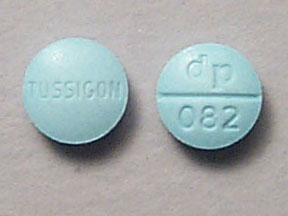Tussigon Dosage
Generic name: HYDROCODONE BITARTRATE 5mg, HOMATROPINE METHYLBROMIDE 1.5mg
Dosage form: tablet
Drug class: Upper respiratory combinations
Medically reviewed by Drugs.com. Last updated on Jul 10, 2023.
Important Dosage and Administration Instructions
Administer TUSSIGON by the oral route only.
Advise patients not to increase the dose or dosing frequency of TUSSIGON because serious adverse events such as respiratory depression may occur with overdosage [see Warnings and Precautions (5.2), Overdosage (10)]. The dosage of TUSSIGON should not be increased if cough fails to respond; an unresponsive cough should be reevaluated for possible underlying pathology [see Dosage and Administration (2.3), Warnings and Precautions (5.4)].
Recommended Dosage
Adults 18 years of age and older: One (1) tablet every 4 to 6 hours as needed; not to exceed six (6) tablets in 24 hours.
Monitoring, Maintenance, and Discontinuation of Therapy
Prescribe TUSSIGON for the shortest duration that is consistent with individual patient treatment goals [see Warnings and Precautions (5.1)].
Monitor patients closely for respiratory depression, especially within the first 24–72 hours of initiating therapy [see Warnings and Precautions (5.2)].
Reevaluate patients with unresponsive cough in 5 days or sooner for possible underlying pathology, such as foreign body or lower respiratory tract disease [see Warnings and Precautions (5.4)]. If a patient requires a refill, reevaluate the cause of the cough and assess the need for continued treatment with TUSSIGON, the relative incidence of adverse reactions, and the development of addiction, abuse, or misuse [see Warnings and Precautions (5.1)].
Do not abruptly discontinue TUSSIGON in a physically-dependent patient [see Drug Abuse and Dependence (9.3)]. When a patient who has been taking TUSSIGON regularly and may be physically dependent no longer requires therapy with TUSSIGON, taper the dose gradually, by 25% to 50% every 2 to 4 days, while monitoring carefully for signs and symptoms of withdrawal. If the patient develops these signs or symptoms, raise the dose to the previous level and taper more slowly, either by increasing the interval between decreases, decreasing the amount of change in dose, or both.
More about Tussigon (homatropine / hydrocodone)
- Check interactions
- Compare alternatives
- Drug images
- Side effects
- During pregnancy
- Drug class: upper respiratory combinations
Patient resources
Other brands
Professional resources
Other brands
Related treatment guides
Further information
Always consult your healthcare provider to ensure the information displayed on this page applies to your personal circumstances.

